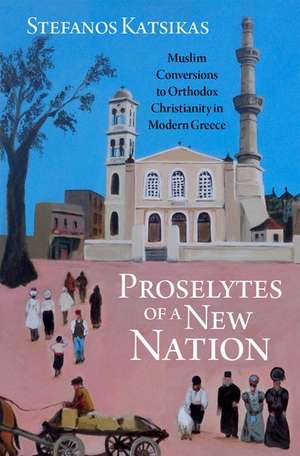Proselytes of a New Nation: Muslim Conversions to Orthodox Christianity in Modern Greece
Autor Stefanos Katsikasen Limba Engleză Hardback – 16 aug 2022
Preț: 436.99 lei
Preț vechi: 485.05 lei
-10% Nou
Puncte Express: 655
Preț estimativ în valută:
83.63€ • 86.65$ • 69.79£
83.63€ • 86.65$ • 69.79£
Carte disponibilă
Livrare economică 17-24 februarie
Preluare comenzi: 021 569.72.76
Specificații
ISBN-13: 9780197621752
ISBN-10: 0197621759
Pagini: 248
Dimensiuni: 229 x 157 x 25 mm
Greutate: 0.48 kg
Editura: Oxford University Press
Colecția OUP USA
Locul publicării:New York, United States
ISBN-10: 0197621759
Pagini: 248
Dimensiuni: 229 x 157 x 25 mm
Greutate: 0.48 kg
Editura: Oxford University Press
Colecția OUP USA
Locul publicării:New York, United States
Recenzii
Katsikas's impressive archival research sheds light on a neglected topic...In this original study, the author demonstrates how conversion to Christianity in the age of nationalism was a survival tactic and a means to acquire the attendant privileges of being a member of the victorious side in post-Ottoman Europe.
This book represents considerable scholarship on the important question of conversion from Islam to Orthodox Christianity during and in the aftermath of the very violent period associated with the War of Greek independence from the Ottoman Empire. Drawing on a wealth of archival and other primary sources, Katsikas presents a clear and engaging analysis of the conditions under which Muslims became Orthodox Christians in this period of dramatic political and demographic change.
Lost in the literature of nationalisms and 'ethnic awakenings', the fate of those individuals and communities converting to a new nation (and religion) has received little attention so far. Stephanos Katsikas successfully unpacks this aspect of modern Greek history and the fate of its first Muslim citizens providing an impressive array of legal, political and historical data to inform one of the most problematic aspects of nation-building in Europe
This book is, without any doubt, a major contribution to the field of Balkan history and broadly, to modern European history. It is based on an unexplored cache of unique source material that is meticulously analyzed and convincingly laid out.
Katsikas' work lays an important foundation in the English language scholarship of post-independence Greece.
Katsikas's detailed analysis of these rare documents is an invaluable contribution not only to the study of ethnoreligious communities of Greece but also to the larger field of transitions to nation-states.
This book represents considerable scholarship on the important question of conversion from Islam to Orthodox Christianity during and in the aftermath of the very violent period associated with the War of Greek independence from the Ottoman Empire. Drawing on a wealth of archival and other primary sources, Katsikas presents a clear and engaging analysis of the conditions under which Muslims became Orthodox Christians in this period of dramatic political and demographic change.
Lost in the literature of nationalisms and 'ethnic awakenings', the fate of those individuals and communities converting to a new nation (and religion) has received little attention so far. Stephanos Katsikas successfully unpacks this aspect of modern Greek history and the fate of its first Muslim citizens providing an impressive array of legal, political and historical data to inform one of the most problematic aspects of nation-building in Europe
This book is, without any doubt, a major contribution to the field of Balkan history and broadly, to modern European history. It is based on an unexplored cache of unique source material that is meticulously analyzed and convincingly laid out.
Katsikas' work lays an important foundation in the English language scholarship of post-independence Greece.
Katsikas's detailed analysis of these rare documents is an invaluable contribution not only to the study of ethnoreligious communities of Greece but also to the larger field of transitions to nation-states.
Notă biografică
Stefanos Katsikas is Associate Director of the Center for Hellenic Studies and Assistant Instructional Professor at the University of Chicago. He holds a PhD in History and Political Sciences from the School of Slavonic and East European Studies at University College London. His research interests lie in the field of modern and contemporary history of Europe, with focus Southeastern Europe, on issues such as democratization, minority-state relations, regional security, the emergence of nationalism and its impact on religious and national identities, Islam, Christianity and Judaism as well as religious conversions. He is the author of Islam and Nationalism in Modern Greece, 1821-1862 and Negotiating Diplomacy in the New Europe: Foreign Policy in the Post-Communist Bulgaria, which received a Scouloudi publication award from the Institute of Historical Research in London. Katsikas is also the editor of Bulgaria and Europe: Shifting Identities; and co-editor of State Nationalism inthe Ottoman Empire, Greece and Turkey: Orthodox and Muslims (1830-1945).
